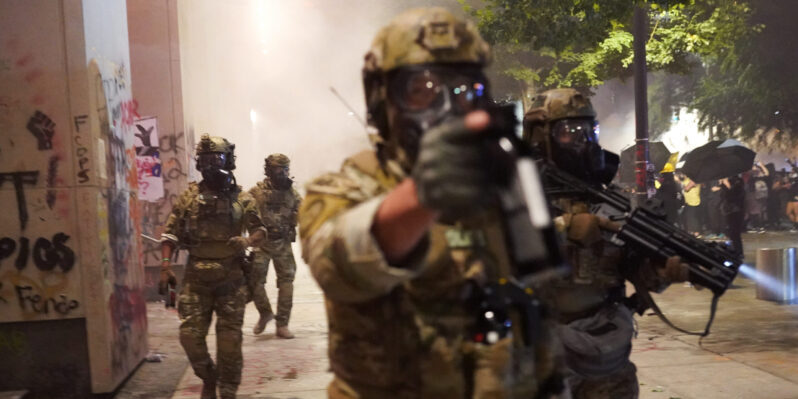Irresponsible or Tyrannical?
Every week, I try to share some insights from history, from my scholarship, or from my experience working in Washington. I am mindful that it would be easy to look at my resume and dismiss me as a partisan. And so I try to be careful about the language I use and the points I make. The truth is that I’m actually a passionate moderate—if that’s not an oxymoron—who is much more comfortable working with centrists from either party than I am with fringe movements on either end of the political spectrum.
So I was very careful in my preparation this week.
Like a lot of Americans, I’ve been watching events in Portland, Oregon, with a growing sense of alarm. Federal law enforcement, dressed in camouflage and kevlar—the stuff of American infantry patrolling in a battle zone—are dispersing protestors with aggressive tactics, and even abducting protestors from the streets and transporting them in unmarked vehicles. The acting-Secretary of Homeland Security says his personnel are “proactively” arresting Americans.
In the editorial pages of America’s leading newspapers, respected columnists are asking “Can we call it fascism, yet?” They wonder if this means Trump may try to hold on to power if he loses the election in November. They warn about the creeping authoritarianism of the Trump administration and wonder what happened to the principled Republicans who previously expressed grave concern about the expansive power of the federal government.
A couple of summers ago, I read a short book by Timothy Snyder, one of the best scholars of 20th century authoritarianism out there, titled simply On Tyranny. In it, Snyder describes the hallmarks of authoritarianism and offers advice to those who would resist it. Several of his lessons came flooding back to me watching events unfold in Portland:
- “Do not obey in advance,” says Snyder. Authoritarians are counting on you to surrender your freedom to their exercise of power.
- “Defend institutions,” he says they are the instruments that preserve our democracy.
- Don’t let them fall, he warns, to the “one party state” that castigates its rivals as illegitimate or criminals.
- “Be kind to our language,” Snyder says. Don’t simply repeat the talking points and crude characterizations we hear from political leaders or in social media.
- “Believe in truth.” Freedom requires a belief in knowable facts that can inform debate and lay the basis for criticizing power. That may require us to research and learn before we speak, or post, or tweet about an issue. But care for the truth is a decidedly anti-authoritarian task.
There is much more, and I strongly recommend the book to anyone who cares about freedom and worries about this moment, but one final passage stopped me cold when I re-read it this week. “Listen for dangerous words,” warns Snyder. “Be alert to the use of the words extremism and terrorism. Be alive to the fatal notions of emergency and exception. Be angry about the treacherous use of patriotic vocabulary.”
Set that warning against the way the president talks about “radical left Democrats” who “will destroy our country as we know it.” He said the situation in Portland was “worse than Afghanistan,” where the United States has been fighting an insurgency for 20 years. He claims his hand is forced by failed leaders, all of whom are “liberal Democrats” who run cities like New York, Chicago, Philadelphia, Baltimore, and Oakland. He describes the protestors in Portland as “anarchists. These are people who,” the president says, “hate our country” who have cowed and physically intimidated the elected mayors, senators, and governor of Oregon. Then the president said, “And you know what? If Biden got in, that would be true for the country. The whole country would go to hell.”
The President of the United States is playing a dangerous and cynical game—dismissing Americans who are protesting for social justice as anarchists, warning that his rivals will destroy the country, using force—or the threat of force—to bolster his political base—and generally acting like a would-be strongman.
If history teaches us anything, it’s that tyranny arrives wrapped in the cloak of patriotism on the backs of politicians more interested in power than in service to others. At best, the president’s rhetoric and deeds are irresponsible. At worst, they are the stuff of tyranny, and we, as citizens, need to be on guard.

